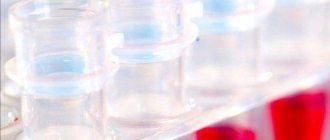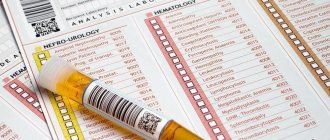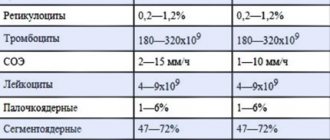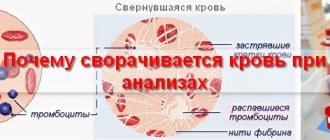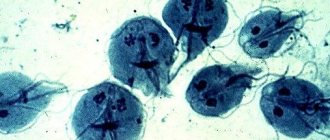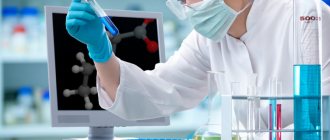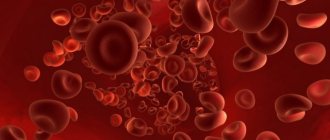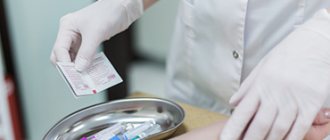You are here: Blood test -
Blood chemistry
- Normal values
- Indications for analysis
- Advantages and disadvantages
- Preparing for the test
- Blood collection for LHC
A biochemical blood test is a laboratory test that allows you to evaluate the functioning of all internal organs. In addition, it provides information about metabolism and metabolism, and also reveals the course of dangerous illnesses long before the first clinical manifestations of the disease occur.
Decoding the results is the responsibility of a hematologist, who during this process uses a special form that includes all acceptable indicators of a biochemical blood test.
The norm and the information received are not always the same: the concentration of a particular substance in the main biological fluid can either decrease or increase. In the vast majority of cases, this is influenced by various diseases and pathological processes.
Less often, less harmless factors can act as provocateurs:
- improper use of medications;
- poor nutrition;
- physical exhaustion of the body.
To accurately establish the cause, information obtained from biochemistry will not be enough. To identify the source, a comprehensive examination of patients is necessary. In addition, the clinician takes into account the symptoms that the patient complains of.
A biochemical blood test involves taking biological material from a vein. This process has its own sequence of actions. It should be noted that in order to obtain the most reliable results, specific preparation for the test is required. If this is not done, you may need to undergo the procedure again, which in some cases is undesirable, namely:
- for children;
- elderly people;
- weakened patients;
- female representatives while carrying a baby.
Biochemical blood test indicators
It is quite clear that only a doctor can decipher the test results; making a diagnosis and prescribing treatment are also exclusively his responsibilities
. But even you and I can form a general impression and decipher the most important indicators. In the end,
Extra information about your own health has never hurt anyone.
So, let's start with glucose. Glucose readings
- these are not only indicators of blood sugar (as some people mistakenly think), but also indicators of the functioning of the pancreas, liver, adrenal glands and even the pituitary gland.
The glucose level also tells us how things are going with carbohydrate metabolism in our body. The norm is from three and a half to six and a half mol/l.
If glucose levels are below normal, this may indicate hormonal disorders and an unbalanced diet.
If your glucose levels exceed the permissible normal level, you should be further examined for diabetes. Protein indicators
-
the norm for protein content in one liter of blood is from sixty to eighty grams
.
A content below the normal level may indicate that the body is experiencing a malfunction of the liver and kidneys, and you are also malnourished. An increased protein content in the blood indicates the presence of inflammatory processes in the body and acute infectious diseases. Also, high protein may be in the test results of those who received a burn. Beta globulins
are components of protein,
the norm is from eight to fifteen percent
, a change in the amount indicates a violation of fat metabolism in the body.
Bilirubin
-
the norm of indicators should not exceed twenty and a half mol/l,
these indicators can tell how the bile ducts and liver cope with their functions, a deviation from the norm upward is an alarming signal that calls us to pay attention to the work and condition of these organs .
Cholesterol
-
the norm is from two point six to six point seven mol/l.
Exceeding the norm is a suspicion of atherosclerosis, a deficiency is a malfunction of the hormonal system and a lack of bile acids.
Triglyceride
-
the norm is from 0.41-1.8 mol/l,
a low level occurs in those who prefer a vegetarian diet, and a high level is observed in those who are too keen on consuming animal fats.
These are just a few points of our test results, but they can help us get an overall picture of our health. But don’t rush to self-medicate!
Only a doctor can accurately decipher the test results, since he takes into account generalized information about all indicators and your individual characteristics.
So, for example, depending on age and gender, the norm of indicators may fluctuate
.
Therefore, let the doctors decipher test results
, make diagnoses and prescribe treatment.
Our task is to get sick less!
Shevtsova Olga, World without Harm
Say “Thank you”:
to the article “Biochemical analysis. What can a drop of blood tell?...” - see below
The reliability of the results obtained largely depends on proper preparation for the study. This is especially true for complex blood tests, which include biochemical analysis. Considering that this examination allows for the timely diagnosis of hidden diseases, it is very important that it be carried out as efficiently and accurately as possible. Let's figure out how to take a biochemical blood test, and what preparation should be done?
What indicators are included in biochemistry?
When performing a biochemical blood test, certain indicators are taken into account. Only a doctor should decipher the result. Independent decryption is not allowed. If a deviation from the norm of any one indicator is detected, this does not necessarily indicate pathology.
The main indicators of blood biochemistry include:
Glucose is the most important source of energy in the body. Carbohydrate compounds are broken down and absorbed in the small intestine. Blood sugar may indicate diabetes. You can also determine how effective the treatment for the disease was. It is important to monitor your glucose levels because it is responsible for energy in the body.
Indications for prescribing the study
A blood test for biochemistry can be carried out as a diagnostic test, to confirm or refute a preliminary diagnosis, as well as to monitor the effectiveness of therapy. In the referral for a biochemical blood test, the doctor indicates the indicators whose value needs to be checked in a given patient. Moreover, this can be either one indicator, for example, plasma glucose level, or several, as when conducting liver tests.
It is necessary to take a biochemical blood test if you have the following health conditions:
- disruptions in the functioning of the cardiovascular or endocrine system,
- diseases of the musculoskeletal system,
- joint diseases,
- problems with various parts of the gastrointestinal tract, in particular the stomach,
- kidney and liver diseases,
- plasma pathologies.
To correctly establish a diagnosis, it is necessary to conduct a qualitative examination of the person.
The doctor who sends the patient for a biochemical analysis must tell the rules for preparing and conducting the examination.
Analysis and medications
Stop using any medications in advance. This applies to vitamins, oral contraceptives, antihistamines, painkillers, hormones, and antibacterial drugs. Only after this is it possible to take a biochemical blood test. Preparing for it is a responsible matter.
There are cases when it is not possible to discontinue the medicine, but the attending physician should be aware of this. If you need to conduct a repeat blood test, this must be done in the same laboratory. The time of day should be approximately the same. Then the result will be reliable. This is how preparation for biochemistry goes; blood donation must be carried out according to the rules.
Preparing for the study
So how to correctly take a biochemical blood test in order to get undistorted results? Let us remind you of the recommendations on how to donate blood correctly, following which you will be able to obtain the most accurate information about the condition of your body.
How to take a biochemical blood test correctly:
- Two days before the test, you need to exclude fatty, spicy, salty and smoked foods, as well as drinks with high sugar content from your diet. Alcohol consumption is also contraindicated. Depending on the indicators used in the biochemical blood test, the doctor may prohibit the consumption of certain types of foods.
- The day before donating blood for biochemistry, it is important to limit physical activity on the body, as well as avoid stress and other emotional experiences that can cause disruptions in the hormonal system.
- Before donating blood, you cannot carry out ultrasound examinations, x-rays, or physiotherapeutic procedures for at least one day, since these studies cause changes in plasma parameters.
Some measurements, such as bilirubin levels or glucose concentrations, may require additional requirements. The doctor who prescribes this examination to the patient must give detailed recommendations for proper preparation for the test.
how to prepare properly. to donate blood for biochemistry?
strange spring
Master (2403), closed 5 years ago
Lyudmila Shevchenko (Yatsenko)
Thinker (8076) 5 years ago
Preparing the patient for the blood donation procedure
A number of tests are done strictly on an empty stomach. For example, biochemical (glucose, cholesterol, bilirubin, etc.) and serological tests (syphilis, hepatitis B). hormones (TSH, parathyroid hormone), etc. “On an empty stomach” is when at least 8 hours pass between the last meal and blood drawing (preferably at least 12 hours). Juice, tea, coffee, especially with sugar, are also food, so you will have to be patient. You can drink water. If you have to take a general blood test, your last meal should be no later than 1 hour before donating blood. Breakfast may consist of unsweetened tea, unsweetened porridge without butter and milk, and an apple. It is advisable to exclude fatty, fried and alcohol from the diet 1-2 days before the examination. If there was a feast the day before, reschedule the laboratory test for 1-2 days. Avoid smoking an hour before blood collection. The content of many analytes in the blood is subject to daily fluctuations, so for some studies blood should be donated strictly at a certain time of day. So, the blood tests for some hormones (TSH and parathyroid hormone). and they also rent out hardware only until 10 am. When donating venous blood, it is necessary to exclude factors that influence the research results: physical stress (running, climbing stairs). emotional excitement. Therefore, before the procedure, you should rest for 10-15 minutes in the waiting room and calm down. Blood is tested before starting medications (for example, antibacterial and chemotherapy) or no earlier than 10-14 days after their discontinuation. The exception is when they want to study the concentration of drugs in the blood (for example, valproic acid, anticonvulsants). If you are taking medications, be sure to tell your doctor about this. Blood should not be donated after X-rays, rectal examinations, or physical therapy procedures. During hormonal studies in women of reproductive age (from approximately 12-13 years of age until the onset of menopause), the results are influenced by physiological factors associated with the stage of the menstrual cycle. Therefore, when preparing for examination for the hormones FSH, LH, prolactin, estriol, estradiol, progesterone, the phase of the cycle should be indicated. When conducting a test for sex hormones, strictly adhere to the recommendations of your doctor about the day of the menstrual cycle on which you need to donate blood. When performing tests for the presence of infections, it should be taken into account that depending on the period of infection and the state of the immune system, any patient may have a negative result. But, nevertheless, a negative result does not completely exclude infection. In doubtful cases, re-analysis is recommended. Different laboratories may use different research methods and units of measurement. In order for the assessment of your results to be correct and the results to be acceptable, do the studies in the same laboratory, at the same time. Comparison of such studies will be more correct.
Navigator
Student (201) 1 year ago
You don’t have to eat or wash your face for a week, and you don’t have to shit for a week before the procedure.
Svetlana
Artificial Intelligence (221476) 5 years ago
It is best not to eat for 12 hours on an empty stomach.
strange spring
Master (2403) 5 years ago
and not even drink plain water before the test?
Svetlana
Artificial Intelligence (221476) It’s better not to do it in the morning.
Sergey Chernysh
Guru (2716) 5 years ago
It's better not to drink alcohol for a week
Lyudmila
Enlightened (42365) 5 years ago
Two days before the test, do not consume fatty foods, fried foods, or alcohol. Do not have breakfast in the morning.
Ivan Gerentsev
Oracle (58985) 5 years ago
in the morning, don’t drink anything, don’t eat anything, and don’t even wash your face, alcohol is also a weekly ban
Nastya Litunovskaya
Enlightened (42036) 5 years ago
Do not eat before donating blood
Alexander
Connoisseur (250) 1 week ago
It’s best to check this where you will take it! they may have peculiarities. Well, over time, technology changes and advice may not be relevant. so I checked with the company where I rented it. By the way, they maintain up-to-date information on this topic on their website. But I still checked by phone. General recommendations for patients when preparing for tests: https://gemoscreen.ru/about/useful_info/
Conducting research
To ensure that the examination results are not distorted by random factors, the patient must follow the following rules on the day of the test:
- Blood is donated for biochemistry on an empty stomach. At least 12 hours must pass between eating and taking blood for biochemical testing. However, fasting for more than 48 hours is also undesirable. Before taking blood in the morning, you should not eat any food or drink any drinks, including clean water.
- You can take any medications only in case of emergency and with prior agreement with your doctor, since blood biochemistry in this case changes significantly. Moreover, it may take several days to completely remove some drugs from the body, so this issue should be discussed in advance with your doctor.
- Before donating blood, it is not recommended to smoke for at least 40-60 minutes, since nicotine affects the body's production of certain biologically active substances and increases the number of red blood cells and glucose concentration.
- Plasma should be donated in a calm state. Even if you are late for an examination, you should not go into the laboratory out of breath. You must sit in the waiting room for at least 15 minutes before taking the test until your plasma levels return to normal.
- During sample collection, the patient should be in a sitting or lying position, in a relaxed state.
- Is blood donated from a vein or from a finger? For research, only blood is taken from peripheral veins. It is most convenient to take a sample from the cubital vein. However, if this cannot be done, for example, due to injury or burns to the hands, then the sample is taken from a vein in the lower extremities or on the hand.
- Before collecting the sample, the area of skin where the blood is taken is wiped with an antiseptic solution. Most often, a solution of ethyl alcohol or hydrogen peroxide is used for this.
- To draw blood, use a sterile disposable syringe or a special system for drawing blood from a vein. The analysis is taken only by an experienced laboratory technician.
- A sample of approximately 5-10 ml is placed in a completely dry and sterile tube and sent for examination.
The result is ready quite quickly. The time required for a laboratory technician to analyze the results obtained usually does not exceed several hours.
If, to monitor the effectiveness of treatment, the doctor prescribes a repeat test after a certain period of time, it is advisable to carry it out in the same laboratory. If all analyzes are done on the same equipment, using the same methods and using the same reagents, then their comparison will be more correct and accurate. Correct biochemical analysis will become the basis for an accurate diagnosis of the patient.
Preparation for a biochemical blood test must be mandatory, otherwise the analysis will show distorted data, and the diagnosis will be impossible to establish, or it will be erroneous. This is a laboratory test that most accurately helps to diagnose all organs and systems in the human body. This study will show the functions of organs and tissues, deviations from the norm, rheumatic and inflammatory processes. In addition, this examination helps to identify any deviation from the norm of various microelements, changes in water-salt metabolism. The patient's diagnosis depends on this blood test. All data obtained helps to adjust treatment, taking into account the stage and form of the disease.
Preparation and procedure of blood biochemistry
A biochemical blood test is a diagnostic that allows you to assess the functioning and condition of a person’s internal organs.
The procedure for donating blood biochemistry is familiar to everyone. To get tested, you need to come to the laboratory on an empty stomach in the morning and donate venous blood. The nurse tightens the forearm with a tourniquet and uses a needle to fill the tubes with venous blood.
The procedure for donating blood depends little on the patient, but he can properly prepare for the procedure so that the result is reliable and the blood does not clot prematurely.
Preparation for a biochemical blood test is standard and includes the usual set of recommendations, which are reported by the nurse before blood sampling:
- The procedure is carried out on an empty stomach. Blood donation is not always done early in the morning. If the analysis is required urgently, it can be taken at another time of the day, but it is important that at least 6-8 hours have passed since the meal. No snacks, tea, or coffee are advisable. You can only drink clean, unsweetened water without gas.
- If it is important to know the exact blood sugar level, then it is not advisable to even brush your teeth with toothpaste in the morning and use mouth rinses.
- Blood is donated before other procedures. If other procedures are scheduled for the same day (MRI, X-ray, IVs, injections), blood is donated first, and then everything else.
- It is not advisable to overload your stomach the day before. To ensure the reliability of the liver, gall bladder, and pancreas indicators, it is advisable to go on a non-strict diet for 2-3 days: do not eat fried, fatty, spicy, fast food, or sauces.
- You should not consume large amounts of fats on the eve of the test, as they provoke increased clotting. The blood serum becomes cloudy and unsuitable for testing.
- It is recommended to stop taking medications before the procedure. On the day of the examination, it is not advisable to take any medications: vitamins, oral contraceptives, antihistamines and painkillers, hormones, antibiotics, etc. If it is impossible to stop taking it, you should inform your doctor. Taking medications that affect blood composition should be stopped a week before the test.
Repeated analysis is carried out in the same laboratory. If the test is repeated to confirm the diagnosis, it should be taken in the same laboratory and, if possible, at the same time of day as the first time.
How to properly prepare for a biochemical blood test?
In order for all the data obtained in this examination to be correct, it is necessary to properly prepare for this procedure.
6-10 hours before the procedure, it is prohibited to drink alcohol, strong coffee, milk, tea and juices.
If you are thirsty, you can drink some purified water. Mineral water or carbonated water is prohibited, otherwise this may affect the indicators, making the entire examination incorrect. And this will affect the incorrect diagnosis and incorrect treatment methods for the patient. As for alcohol, you need to give it up two weeks before the procedure.
Before donating blood for analysis, you are prohibited from eating. You must abstain from food for 12 hours. During this procedure, a thymol test and other types of analysis will be carried out. It is forbidden to chew gum on the day you are due. The same applies to various candies, even if they do not contain sugar. To ensure that all parameters and indicators of various criteria are not subject to changes, it is not recommended to change your daily routine or change your diet in the last three days before donating blood for analysis. But it is permissible to avoid fried, fatty, spicy and spicy foods.
As for sports, they must be canceled three days before the blood is drawn.
By the way, when the patient comes to donate blood, he needs to sit quietly for 15 minutes. This rest should restore normal blood pressure and pulse. Especially if the patient was in a hurry.
You need to donate blood in the morning on an empty stomach. The procedure must be performed between 7.00 and 11.00 am. This is due to the fact that all indicators and their standards are developed only for a given period of time.
If the patient uses certain medications to treat various diseases, then, if possible, they should be discontinued three days before blood donation. Otherwise, they will distort some parameters, which means that the overall analysis will be incorrect. If it is impossible to discontinue these drugs, then the doctor who will conduct the laboratory test must be warned about this.
It is best to have your blood tested at the same facility. This is due to the fact that different laboratories sometimes use different techniques to conduct the test and compare them with the norms.
Massage and other treatments should be carried out after this test is done. The same applies to various procedures and examinations. They can only be performed after blood has been taken for biochemical analysis. Otherwise, there is a risk that some parameters will be distorted.
Basic Rules
Since biochemistry can determine the presence of various substances in the blood, you need to know how to prepare for a specific study. But at the same time, there are general basic rules that must be followed in order to obtain reliable results.
You need to donate blood on an empty stomach. It must be remembered that it should be taken from the patient no earlier than 8 hours and no later than 14 hours after eating. It is allowed to drink only non-carbonated mineral water during this time period.
It is believed that the optimal time for collecting blood on an empty stomach from a patient is from 8 to 11 am. This is due to the fact that biochemical blood parameters change throughout the day, but the parameters obtained in the morning are considered reference values. In addition, to obtain reliable data, you must follow the following basic rules:
- Avoid alcohol 2 weeks before the test.
- It is necessary to exclude fatty, spicy and fried foods from the diet 3 days before the test, but there is no need to radically change your usual diet.
- 3 days before the study, you should avoid increased physical activity, including professional sports training.
- It is necessary to donate blood before carrying out the prescribed physiotherapeutic procedures.
Other Important Requirements
You should know that smoking affects the production of various bioactive substances in the human body. Therefore, heavy smokers need, if not completely quit smoking, then a couple of days before the analysis, reduce the number of cigarettes they smoke. You need to stop smoking completely one hour before blood sampling.
Taking medications can also distort test results. They must be abandoned three days before the biochemical analysis, but if this cannot be done, then the attending physician must be notified.
To exclude an incorrect diagnosis, this fact must be taken into account when interpreting the results. You should be aware that common medications can affect biochemical analysis parameters in the following ways:
- Vitamin C and paracetamol increase the amount of glucose.
- Vitamin A and some hepatoprotectors affect ESR.
- Aspirin and antibiotics reduce hemoglobin.
The accuracy of the data may also be affected by the psycho-emotional state of a person. Therefore, immediately before donating blood, you should sit in a relaxed state for about a quarter of an hour, trying to tune in to the positive.
How is blood drawn?
Blood sampling should be done with the patient lying or sitting. A tourniquet must be installed on the arm. The injection is made in a place below the tourniquet. Before piercing the skin, it is necessary to wipe it with an antiseptic solution. This is required so that during the procedure the infection is not brought inside. The needle must be inserted slowly. The sample is taken from a vein. The blood goes into a test tube. After this, the blood fluid should be immediately sent to a biochemical research laboratory.
Most often, such an analysis of all takes no more than 1 business day. In some cases, it is necessary to obtain research results very quickly. Then, during an emergency test, within 15-20 minutes it will be possible to obtain information about the main parameters. This examination is considered completely safe for humans. The doctor uses various chemicals to produce the required reactions. A large number of techniques have been developed that help identify all deviations in the criteria.
Parameters that can be determined during a biochemical blood test
Such a study helps determine about 200 parameters of a person’s health status. Among the main indicators are the level of hemoglobin and haptoglobin, various proteins, urea, creatinine, uric acid, fats, glucose, ammonia, cholesterol, bilirubin, AST, ALT, triglycerides, sodium, calcium, fluorine, chlorine, potassium and other compounds.
For example, the standard hemoglobin level for men is 130-160 g per liter, and for women the standard level is lower - 120-150 g per liter. If the level is below normal, this indicates anemia.
Haproglobin is known as a glycoprotein that is part of blood plasma. Its parameter can fluctuate in different ranges.
The parameter of various types of proteins indicates the occurrence of metabolic processes in the human body. If the indicators are elevated, this may indicate dehydration, burns, cholera, or injuries. It increases if a person is actively involved in sports.
Protein levels will be below normal if a person has been fasting, as well as with kidney disease, hemorrhage, diabetes, poisoning, liver disease, and intestinal infections.
Urea is an indirect parameter that helps determine the level of kidney function.
If the parameter increases, this indicates that the patient is suffering from kidney disease. He may have pyelonephritis, kidney failure, hydronephrosis and other diseases. Creatinine indicates kidney function.
Uric acid is a parameter that characterizes metabolism in the human body. If the criterion begins to exceed the norm, this indicates gout, anemia, diabetes, eczema, liver disease, vitamin B deficiency, and alcohol poisoning.
Glucose is a criterion that helps evaluate the functioning of the pancreas. It increases with diabetes, thyroid problems and other diseases. And it decreases with fasting, liver and brain problems.
Blood fats help assess fat metabolism throughout the body. The criterion exceeds the norm for hepatitis, overeating, bile flow, diabetes, liver problems, kidney problems and other diseases.
Cholesterol helps determine the overall health and functioning of the liver. The indicator increases with atherosclerosis, tumors, diabetes, heart attack, liver disease and other diseases. A hereditary predisposition can lead to low cholesterol. This is associated with cirrhosis of the liver, tumors in this organ, thyroid problems and other ailments.
There are other indicators that help determine the functioning of different organs and tissues.
A biochemical blood test allows you to find out the general health of the patient, as well as problems with the functioning of various organs and systems. Doctors often use this technique to make a diagnosis, because... it is distinguished by its accuracy and breadth of information obtained. But for the data to be real, it is necessary to properly prepare for this procedure. And for this you need to adhere to all the rules.
Purposes of biochemical blood tests
The task of a biochemical blood test is to determine the level of biological substances in the body and their deviations from normal values. Based on these data, one can judge whether there is a disease, its severity, and the degree of organ dysfunction. For example, products of nitrogen metabolism (urea, creatinine) leave our body through the urinary tract. When determining the value of these indicators, one can judge the functioning of the kidneys.
Rules for preparing for blood biochemistry analysis
In order for the analysis result to be reliable, the preparation conditions must be observed.
Meal breaks
This is a significant factor that influences the result of the analysis. All patients should remember that the test is taken on an empty stomach. It is optimal to donate blood after a 12-hour fast. Eating before the examination will inevitably lead to an increase in glucose and liver enzymes.
Prolonged fasting (more than 14 hours) will also distort the results. After 48 hours of fasting, an increase in bilirubin and triglycerides and a decrease in glucose may be observed.
Nutritional nature
The day before the test, you should not eat fatty or smoked foods. Fatty foods increase the concentration of potassium, triglycerides, and alkaline phosphatase in the blood serum. It is not recommended to excessively consume butter and cheese on the eve of the test, as this contributes to a change in the ratio of lipoproteins. Excessive consumption of protein foods can cause an increase in urea and ammonia.
Many patients believe that they can drink coffee or tea before taking the test. No, you can't do that! This is also food, the intake of which will lead to an unreliable result. You can only drink still water.
Physical activity
The day before the test, you need to eliminate excessive loads. This load promotes an increase in lactate dehydrogenase, AST, and creatine kinase, which persists for 24 hours. If you had to run to the laboratory, it is better to take a break for 15 minutes and then just go for analysis.
It is better to remove stress from your life. In biochemical analysis, with prolonged anxiety, a decrease in iron concentration and an increase in fatty acids can be observed. Alcohol
The day before the test, you should not drink alcoholic beverages. Alcohol leads to an increase in triglycerides and uric acid in the blood. In addition, alcohol is a hepatoxic substance, which will cause an increase in liver enzymes.
Analysis time
Biochemical analysis is carried out in the morning. It is done between 8 and 11 o'clock. This is due to the fact that blood counts fluctuate throughout the day. And laboratory standards are developed for morning indicators.
Taking medications
Three days before the examination, you should avoid taking medications. If it is not possible to do this, then you need to tell the laboratory assistant or doctor who will interpret the result.
Other examinations
A biochemical blood test is taken before instrumental examinations ( ultrasound, FGDS)
and others) and
physiotherapeutic procedures
.
Proper preparation is one of the important points in the diagnostic process. With this knowledge, the patient will avoid diagnostic errors and misdiagnosis.
Throughout life, every person needs to take a blood test. The reasons for conducting research may vary. Some patients need to donate blood because of an illness, while others need it for preventive purposes. Whatever the reason for conducting the study, preparation for donating blood during a biochemical analysis must be followed by everyone. If the recommendations are not followed, the results obtained may be unreliable and mislead the doctor. A specialist may prescribe incorrect and sometimes completely unnecessary treatment.
Biochemical blood test is a common and informative method of laboratory diagnostics. Thanks to the study, it is possible to evaluate the functioning of all organs and systems of the human body. The added value of the analysis is that it only takes one day to get results.
The only exceptions are some indicators determined as part of biochemistry. In modern laboratories, research can determine a huge number of important indicators, which is especially valuable when diagnosing diseases.
With a biochemical study, it is possible to assess with a high probability the correct functioning of the kidneys, gastrointestinal tract and other systems, to identify infection or contamination of the body, and autoimmune pathologies. The analysis also reveals a lack of vitamins and microelements and the presence of certain antibodies in the blood. The research algorithm is a complex and responsible process. The time that will be spent on it depends on the number of indicators being studied.
Biochemical research is an important method of laboratory diagnostics used in all areas of medicine.
The data is used by endocrinologists, gynecologists, surgeons, therapists and other doctors. Thanks to its results, the specialist can fully observe which organ or system of the patient is not working correctly. This greatly facilitates the choice of further examination and treatment methods. The test must also be taken for the purpose of disease prevention and health monitoring.
Normal biochemistry values
The norms for a biochemical blood test are individual for each person. This is due to the fact that indicators may differ slightly depending on factors such as a person’s gender and age category.
There is an official BAC form (data included in the biochemical analysis) used in all laboratories.
The following table most accurately displays the main indicators:
| Component of blood | Normal indicators |
| Total protein | children – 58-76 g/l; adults – 64-83 g/l. |
| Albumin | children – 38-54 g/l; adults – 35-50 g/l. |
| Myoglobin | women – 12-76 mcg/l; men – 19-92 mcg/l. |
| Transferrin | 2-4 g/l |
| Ferritin | men – 20-250 mcg/l; women – 10-120 mcg/l. |
| OZhSS | 26.85-41.2 µmol/l |
| SRB | no more than 0.5 mg/l |
| Rheumatoid factor | up to 10 units/ml |
| Total cholesterol | 5.2 mmol/l |
| Ceruloplasmin | 150-600 mg/l |
| Triglycerides | 0.55-1.65 mmol/l |
| Urea | children – 18-64 mmol/l; adults – 2.5-83 mmol/l. |
| Creatinine | men – 62-115 µmol/l; women – 53-97 µmol/l; children – 27-62 µmol/l. |
| Uric acid | men – 0.24-0.5 mmol/l; women – 0.16-044 mmol/l; children – 0.12-0.32 mmol/l. |
| Bilirubin | general – 3.4-17.1; connected – 25% of the total; free – 75% of the total. |
| Glucose | children – 3.33-5.55 mol/l; adults – 3.89-5.83 mol/l. |
| Fructosamine | no more than 280 mmol/l |
| ASAT | women – up to 31 units/l; men – up to 35 units/l; children - individually. |
| AlAT | women – up to 31 units/l; men – up to 41 units/l. |
| alkaline phosphate | children – 1300-600 units/l; adults – 20-130 units/l. |
| Alpha amylase | no more than 120 units/l |
| Lipase | 0-417 units/l |
| QC and KFK | women – up to 170 units/l; men – up to 195 units/l. |
| MV-fraction KK | not less than 10 units/l |
| LDH | 120-240 units/l |
| GGTP | children - from 17 to 163 units/l; women – 7-31 units/l; men – 11-50 units/l. |
| Sodium | children – 130-145 mmol/l; adults – 134-150 mmol/l. |
| Potassium | children – 3.6-6 mmol/l; adults – 3.6-5.4 mmol/l. |
| Chlorides | 95-110 mmol/l |
| Phosphorus | children – 1.3-2.1 mmol/l; adults - 0.65-1.3 mmol/l |
| Magnesium | 0.65-1.1 mmol/l |
| Iron | men – 11.6-30.4 µmol/l; women – 8.9-30.4 µmol/l; children – 7.1-21.4 µmol/l. |
| Calcium | 2-2.8 mmol/l |
| Zinc | children – 11-24 µmol/l; adults – 11-18 µmol/l. |
| LDL | 1.71-3.5 mmol/l |
| Gamma-GT | women - up to 38 units/l; men – up to 55 units/l. |
| Chlorine | 98-107 mmol/l |
| Folic acid | 3-17 ng/ml |
| Vitamin B12 | 180-900 ng/ml |
| Lactic acid | children – 295 units/l; adults – 250 units/l. |
It is very important to note that the norm of a biochemical blood test in women during pregnancy will differ from the above parameters. This can be either a completely normal phenomenon or a sign of various ailments. Whether this is a norm or a violation can only be determined by a clinician.
The above components of the main biological fluid indicate that the biochemical blood test includes:
- proteins and enzymes;
- lipids and pigments;
- carbohydrates and vitamins;
- indicators of nitrogen metabolism;
- wide range of microelements.
Preparation rules
To obtain reliable analysis results, you must prepare for the procedure before submitting the material. The preparation algorithm is based on compliance with certain rules that require simple restrictions and are easily achievable at any age. Biochemical blood tests are carried out in compliance with the following recommendations:
- You need to donate blood on an empty stomach. At least 8 hours should pass between collecting the material and dinner.
- You are allowed to drink water before donating blood.
- Material for research is collected in the morning.
- Patients are prohibited from drinking alcohol for several days before submitting the material.
- During the day before collection, you need to follow a non-strict diet with the exception of fatty, fried and salty foods.
- A few hours before donating blood, smoking and overexerting yourself physically and emotionally are prohibited.
- Before visiting the laboratory assistant, you need to rest.
- The technique for taking material is determined based on the patient’s age and the condition of the veins. In adults, blood is most often taken from the cubital vein, and in infants, blood is taken from the veins on the head or heel. Where the sample will be taken from is determined by the laboratory technician after a visual examination of the patient.
It is also important to know that some medications can distort the results of the study. You need to prepare for the analysis taking into account drug therapy. It is recommended to stop taking medications several days before the blood draw. If this is not possible, then you must inform your doctor about the medications you are taking. There is no need to neglect following the recommendations, as distorted results will mislead the doctor. If all the rules are not followed, for example, blood was not donated on an empty stomach, then it is imperative to notify the doctor.
How does food affect results?
The evening before your scheduled blood test, it is best not to eat too much. This will overload the gastrointestinal tract. And if you need to identify diseases in the liver, pancreas, gall bladder, then it is better to stick to the diet for 2-3 days. Moreover, fatty, fried, salty foods, fast food, sauces will have a negative effect on the organs and distort the result.
Fats that a person ate the day before can cause high clotting. Turbid blood serum will become unsuitable for testing.
Preparation rules for certain indicators
Some indicators determined within the framework of biochemistry require specific preparation. The general recommendations are not canceled and must be followed, but additional rules will be added. How to properly prepare for the study, based on what indicator is being studied, we will consider below:
- Urea. Blood must be donated on an empty stomach, and you can drink water. Even minor physical exertion is prohibited. For several days it is necessary to follow a diet excluding meat and fish dishes, tea and drinks containing coffee.
- Cholesterol, lipoproteins. The preparation algorithm is similar to other indicators, that is, blood is donated on an empty stomach in the morning. It is recommended to avoid taking medications that lower lipid concentrations 14 days before the test.
- Glucose. To prepare for the study, it is not enough to simply donate blood on an empty stomach. Do not brush your teeth or chew gum. Diuretics and some other medications can also distort the results, so you should notify your doctor about therapy.
- GTG (glucose tolerance test). The preparation algorithm is that the patient does not need to follow a diet. You need to eat as usual. Blood is taken in the morning on an empty stomach, after fasting for 10-12 hours. Before taking the test, you should avoid taking medications. The analysis technique involves intravenous or oral administration of glucose. During the procedure, the patient should not walk, smoke, or be nervous.
- Haptoglobin. Before the analysis, it is mandatory to consult a doctor about discontinuing medications. Blood is also donated on an empty stomach, and you can drink water.
- Fibrotest. The preparation algorithm consists of discontinuing medications and foods that color the blood serum (carrots, tangerines). You can drink clean water without dyes. Blood is donated on an empty stomach.
The study of some indicators of biochemical analysis requires compliance with additional rules. The preparation is simple and can be done at any age. The technique for collecting blood is the same in all laboratories, regardless of the indicator being studied. The test can be done either in a paid clinic or in a clinic at the place of attachment, having first taken a referral from a doctor.
Blood biochemistry allows you to assess the correct functioning of all organs and systems of the body.
In order to prevent diseases, it is recommended to undergo a test once a year, even if there are no symptoms of pathology. Preparation for a biochemical blood test is mandatory, since its absence can seriously distort the results of the study and mislead the doctor. In this case, the treatment technique and further examination may be chosen incorrectly. Proper preparation for the analysis will significantly save time spent on making the correct diagnosis.
Special preparation for blood tests for biochemistry, hormones and other factors
The listed restrictions are sufficient for routine blood tests. If a doctor prescribes an analysis of blood biochemistry, hormones or other factors, special preparation is required:
- cholesterol and lipid studies - only after a twelve-hour fast and a two-week cessation of taking medications that lower blood lipid levels;
- urea, uric acid, creatinine - therapeutic nutrition - 2-3 days before the analysis, avoid tea, coffee, protein products and heavy physical activity;
- bilirubin - it is not recommended to take ascorbic acid, foods and medications that color the blood serum the day before;
- sex hormones in women - only on the days of the menstrual cycle and exclusively on the advice of a doctor;
- calcium – do not take medications containing calcium for three days before the test;
- thyroglobulin - no earlier than six weeks after thyroidectomy or a course of treatment, before a biopsy or ultrasound of the thyroid gland;
- thyroid hormones - 2-3 days before the test, iodine-containing drugs and food products are discontinued; thyroid hormones are discontinued a month before the test, unless otherwise directed by the doctor,
Source: medaboutme.ru

